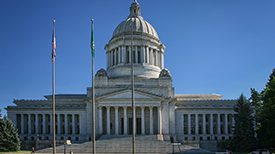By Lizzeth Mancilla
Engagement and Policy Intern
 The Washington state Legislative Session started this Monday, where hundreds of bills concerning early learning, safe and supportive schools, local levies/LEA, special education, etc. are being introduced in either the Senate or House of Representatives.
The Washington state Legislative Session started this Monday, where hundreds of bills concerning early learning, safe and supportive schools, local levies/LEA, special education, etc. are being introduced in either the Senate or House of Representatives.
In this webinar, League of Education Voters Director of Policy and Research Jacob Vela and government relations consultant Carey Morris give an overview of the 2021 legislative landscape, outline our priorities for the 2021 legislative session, and answer questions.
On what we can expect this legislative session
Since everything is virtual this year, Carey Morris, government relations consultant, describes how the biggest loss is “the magic of the human element.” She finds in-person sessions inspiring because a room full of people who may share different views and opinions, still come together to build strong legislation. She certainly misses running into people in the hallways, attending debates with others, and seeing legislators work together.
However, although everything from committee meetings, to testimonies, etc., are virtual, there are many pros. Individuals who haven’t been able to attend the session in Olympia, are now able to participate virtually. For example, individuals have the ability to testify virtually, but may also do so in a written format.
Another exciting change is the representation of women and people of color. “The House Democratic committee is 60% women and 40% BIPOC… There will be real conversations that need to happen… Actually having people of color at the table is so important and exciting,” Carey said.
Other great news Carey has heard is that people believe the majority of the bills will be bipartisan in nature and aren’t expected to have anything too controversial.
On what League of Education Voters is prioritizing in 2021
Jacob shared LEV’s four legislative priorities for this year:
High-Quality Early Childhood Education for Every Early Learner
The COVID crisis has reaffirmed the importance of this priority. Access to high-quality early learning is critical both “from an early learner perspective, but also a family perspective.” It is critical to preserve and expand access to high-quality early learning, especially to low-income families.
Supportive, Safe, and Accessible Learning Environments for Every Student in K-12 Schools
One major aspect of this priority is supporting the implementation of Universal Design for Learning. The current remote learning environment has highlighted the need to make the learning environment meet the needs of every student. Jacob stated that UDL is about accommodating the diverse range of student learning needs since students have their own preferences for how they intake and retain information.
Another important component of this priority is providing students with reliable and consistent access to mental health services. Even prior to COVID-19, our youth were “facing an increasing level of mental health challenges and anxiety.” As we attempt to overcome the learning loss and disruption to the learning environment that students have experienced, “we’re gonna have to support them in their mental health needs and social-emotional growth areas so they can be in a position to re-engage in the learning process and make some academic progress that was slowed down or halted during this current crisis,” Jacob said.
Establishing Equitable Resourcing Structures Centered on Student Need
Schools should have the resources required to meet the academic and non-academic needs of students, as well as adequate support to be able to provide any additional resources to students as well.
In addition, “[LEV] feels that there needs to be a new revenue source that is created in order to sustain the well-being of our communities,” he said.
Sufficient and Effective Resources for Every Student Receiving Special Education Services
Since Washington state has one of the highest rates of excluding students with disabilities from the general education setting, “we’re trying to create the support, technical assistance, and structures for districts so they can be better positioned and more empowered to provide a better educational experience for students with disabilities,” Jacob said.
In addition, Washington doesn’t provide enough resourcing for students with disabilities receiving special education services. Therefore, LEV believes we need to resource districts to ensure students have the ability to access their education.
Watch the recording of What to Expect in the 2021 Legislative Session
Read our 2021 Legislative Priorities
Love what we do? Support our work
Want to find out the latest in education news in Washington? Subscribe to our newsletter
Want to learn more about League of Education Voters? Find out here